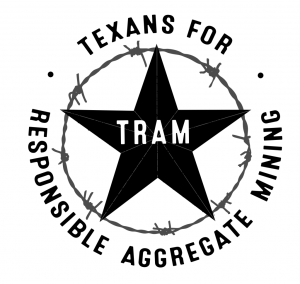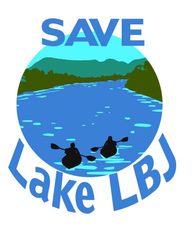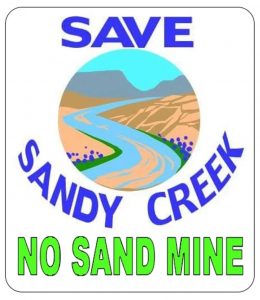Aggregate Mining

Aggregate Mining in the Hill Country
Aggregate mining, the extraction of sand, gravel, and limestone rock from where it naturally occurs, is a challenge facing communities across the Hill Country as the region grows and the need for infrastructure in Texas expands. When Aggregate Production Operations (APOs) move in, their impacts on nearby communities and natural resources are significant. The impacts of these around-the-clock operations include dangerous air pollution, water pollution and over-use, heavy truck traffic, increased flooding impacts, and nuisances like blasting, noise, odor, and light pollution.
Managing Massive Growth in Texas
For additional background on Aggregate Production Operations (APOs) in Texas, see this video from Texans for Responsible Aggregate Mining (TRAM).
Join Our Partners
 Texans for Responsible Aggregate Mining (TRAM) is a statewide coalition of member groups seeking to work with lawmakers, state agencies, and good-faith industry operators to create state standards for best management practices in the rapidly expanding Aggregate Production Operation (APO) industry, and adopt those standards into law. Our goal is to create a healthier, safer and more desirable community for Texans as well as a more efficient APO industry that is aligned with the concerns of the communities in which they operate.
Texans for Responsible Aggregate Mining (TRAM) is a statewide coalition of member groups seeking to work with lawmakers, state agencies, and good-faith industry operators to create state standards for best management practices in the rapidly expanding Aggregate Production Operation (APO) industry, and adopt those standards into law. Our goal is to create a healthier, safer and more desirable community for Texans as well as a more efficient APO industry that is aligned with the concerns of the communities in which they operate.
 Save Lake LBJ is an organization working to stop an industrial sand plant and dredging operation from setting up shop on the Shores of Lake LBJ. Save Lake LBJ is a group of concerned citizens who have banded together to stop the industrialization of Lake LBJ. This site was created to provide information regarding Collier Materials proposed sand plant in Kingsland, TX. It will be located on the Llano Arm of Lake LBJ on the Miles/Moss Ranch off of CR 309.
Save Lake LBJ is an organization working to stop an industrial sand plant and dredging operation from setting up shop on the Shores of Lake LBJ. Save Lake LBJ is a group of concerned citizens who have banded together to stop the industrialization of Lake LBJ. This site was created to provide information regarding Collier Materials proposed sand plant in Kingsland, TX. It will be located on the Llano Arm of Lake LBJ on the Miles/Moss Ranch off of CR 309.
 Save Sandy Creek is a community of concerned citizens who organized to fight against the industrialization of Sandy Creek, when a sand mine was proposed in 2018 near the Hwy 71 and FM2233 intersection. In June 2020, the group celebrated a huge success when Collier Materials officially withdrew their application for a permit from TCEQ to develop a sand mine on Sandy Creek.
Save Sandy Creek is a community of concerned citizens who organized to fight against the industrialization of Sandy Creek, when a sand mine was proposed in 2018 near the Hwy 71 and FM2233 intersection. In June 2020, the group celebrated a huge success when Collier Materials officially withdrew their application for a permit from TCEQ to develop a sand mine on Sandy Creek.
Highland Lakes Dredge and Fill Ordinance
In the summer of 2020 and in response to a proposed dredging operation, residents of the Highland Lakes area joined forces to prevent the industrialization of Lake LBJ. As a result, the Lower Colorado River Authority has developed and proposed a new Highland Lakes Dredge and Fill Ordinance, which creates three tiers of dredge and fill activities. Tiers 1 and 2 allow for non-commercial dredging, the kinds of projects that have always been done, when necessary, for the purpose of maintaining the lakes and the infrastructure within them. Tier 3 allows for commercial dredging, which is unprecedented in the Highland Lakes. Commercial dredging would industrialize the Highland Lakes in ways we have never before seen, creating dangerous conditions for nearby communities and significantly reducing enjoyment of the lakes by people and wildlife.
On November 17, 2021, the Lower Colorado River Authority (LCRA) Board of Directors voted to adopt Tier 3 ordinance as written. The LCRA has opened the door for major aggregates producers like Vulcan or Martin Marietta to bring their industrial operations into the Highland Lakes.
Additional Information and Coverage
Highland Lakes residents speak at recent LCRA board meeting as agency continues work on new commercial dredging ordinance
October 2021 – Highland Lakes residents who spoke during a recent Lower Colorado River Authority board meeting urged directors to be cautious while creating a new commercial dredging ordinance. At its Nov. 17 meeting, the LCRA Board of Directors will consider whether to adopt the proposed Highland Lakes Dredge and Fill Ordinance (HLDO). The 15 directors also will decide on proposed changes to the existing Highland Lakes Watershed Ordinance (HLWO). Click to read more.
HCA Action Alert Email – Take Action for the Highland Lakes
October 2021 – Read and share the Hill Country Alliance’s action alert regarding the upcoming LCRA Board meeting on Wednesday, Nov. 17, 2021. Click to read more.
Recent Aggregate Production Operation News
Vulcan Materials’ Hill Country quarry gets key permit despite locals’ concerns
A Texas Hill Country quarry recently hit a major milestone years in the making. Despite hundreds of residents trying to halt the controversial project, it now appears to be moving forward outside New Braunfels in Comal County. Read more from Gabriel Romero with Laredo...
Lt. Gov. Dan Patrick asks state to halt new cement plant permits until 2025
Lt. Gov. Dan Patrick has asked the Texas Commission on Environmental Quality, the state’s environmental agency, to halt approving permits for cement production plants in Texas until the 2025 legislative session. Patrick’s letter to TCEQ Chair Jon Niermann on Tuesday...
In Garden Ridge, residents fight a quarry’s expansion plans
As she rides down FM 2252, Lisa Swint gestures out the window to the wall of dirt, rock and debris piled high beside the road. “It’s starting to be kind of the hallmark look of Garden Ridge,” said Swint, a City Council member in the Comal County town of about 4,000...
Opponents plan new fight against quarry
Opponents of a proposed quarry in Comal County are forming a new plan to fight the project after losing their latest effort to block the facility’s air quality permit. Since 2017, the Preserve Our Hill Country Environment Foundation and other advocates have been...
